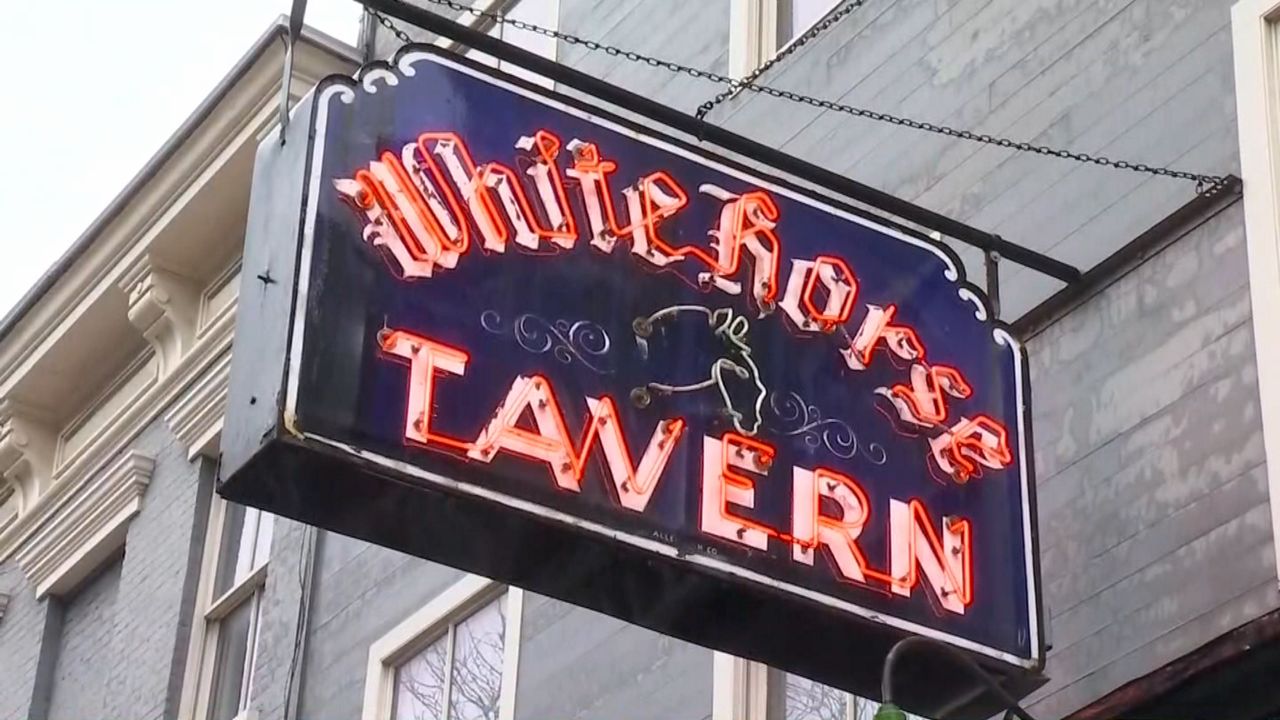NEW YORK CITY — A $40,000 fine wasn’t high enough for the White Horse Tavern, the State Liquor Authority ruled this week.
“I think this place is pretty egregious,” said SLA Commissioner Greeley Ford. “I just think a point needs to be made here.”
“I would counter at fifty thousand.”
The State Liquor Authority ordered Wednesday the historic tavern — which counts James Baldwin and Bob Dylan among past patrons — to pay a hefty fine for 30 violations of state coronavirus safety measures.
White Horse Tavern did not return NY1’s multiple requests for comment, but in July, owners explained they’d been overwhelmed by flocks of people who gathered outside the bar when essential businesses reopened for outdoor service.
“I hope people realize that this new way of doing business was thrust upon us,” owners wrote. “There is no perfect way to deal with hundreds of people showing up out of the blue.”
White Horse Tavern is not the only New York City eatery to face steep fines and suspended liquor licenses this summer.
The SLA has issued social distancing violations to 565 venues — 296 in Manhattan, 156 in Queens, 66 in Brooklyn, 42 in The Bronx and five on Staten Island — from March 20 through Aug. 11.
An additional 111 New York City watering holes and restaurants — 47 in Queens, 30 in Manhattan, 16 in The Bronx, 15 in Brooklyn and 3 on Staten Island — saw their liquor licenses suspended, state records show.
Theses businesses represent just a handful of about 10,000 New York City restaurants and bars that are making it work during the reopening, said Hospitality Executive Director Andrew Rigie.
Rigie stressed the importance of respecting the city and state’s social distancing guidelines, but questioned why restaurant and bar owners should be tasked with enforcing them.
An especially problematic regulation is that of outdoor crowds, he said.
“We’re not deputized as police officers,” Rigie said. “Workers are put in danger if you’re asking them to go halfway down the street to enforce social distancing.”
Rigie also questioned a penalty of steep fines when so many New York City businesses are facing financial hardship and have been burdened with stiffer restrictions than anywhere else in the state, where indoor dining is permitted.
“The majority of businesses are doing the best they can in an impossible situation and unprecedented circumstances,” Rigie said. “And they’re losing their livelihoods.”
The SLA did not reply to NY1’s requests for comment but, in a press statement last week, State Liquor Authority Chair Vincent Bradley noted his office had been tasked with safeguarding New Yorkers' health amid a global pandemic.
"These compliance details are about protecting public health and keeping people safe.” Bradley said. “The SLA will continue to crack down on businesses who flout the law."
During Wednesday’s meeting, the SLA addressed violations at 21 New York City restaurants, among them high-end eateries such as Nello (fined $15,000) on the Upper East Side and Amata ($10,000) in Midtown Manhattan.
But they also looked at smaller, eateries outside Manhattan that work on a smaller scale yet saw similar fines.
Louis Abreu, owner of CJ'S Bar and Lounge in Ozone Park, was told to pay $35,000 for nine violations on three nights in June and July.
Money was hard to come by — the bar has been shut since his license was suspended in mid-July — and court dates are often not available until 2021, both Abreu and Rigie
“I had to borrow money from family just so I don’t lose everything I got,” Abreu said. "How do you hit someone with a fine that big?"
Abreu said he understood the importance of social distancing, but didn’t know how he was supposed to monitor all of his patrons’ behavior all of the time, especially since they’re out in the streets.
If a customer stands up with a beer in her hand, that’s a violation, if a customer grabs a drink at another bar then wanders over to his, that’s a violation, if a customer joins friends and doesn’t order food, that’s a violation.
“I don’t know what they’re trying to do, but they’re putting a lot of places out of business,” Abreu said at first, then reconsidered. “They're enforcing this thing to make money.”



